|
The 1955 Academy of Model
Aeronautics (AMA) National Model Airplane Championships, held at the Los
Alamitos, California, Naval Air Station was by all measures a smashing success -
"the best run Nationals competition in history." Extensive coverage of the event
appeared in the Annual Edition of Air Trails magazine. Free flight and
control line model airplanes were there, but no radio control types attended;
the technology was not yet within reach of enough hobbyists to warrant
inclusion. A look at the photos makes evident the amazing quality and variation
of models, both scale and non-scale. Take a look at the F4U Corsair with the
folding wings, the Ford Trimotor, Fairchild C-119, and the Fokker DR-1 triplane.
Speaking of quality models, two of the feminine kind were on-hand to award
trophies. Hillevi Rombin,
Miss Universe of 1955, and movie starlet
Marla English, are
pictured with two lucky winners. The poor guy who had to settle for the Navy
admiral must have felt gypped ;-) Color photos of the airplanes would have been
great to see.
America's Modelplane Championships
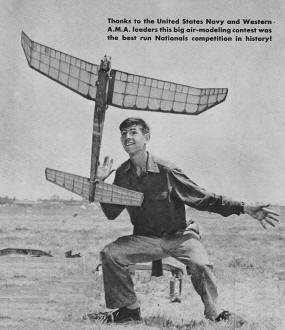
Thanks to the United States Navy and Western A.M.A. leaders this
big air-modeling contest was the best run Nationals competition in history!
Photos By John Schneider, Jackson Ingham, Jr. and Dick Everett
Reviewed by Dick Everett
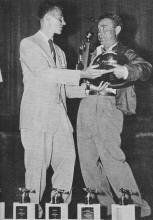
Alex Schneider (r) receives Roberts R/C trophy from Keith Storey
during victory "dance." Dodger Grotheer does the VTO.
In our book, the 1955 National Model Airplane Championships, the 24th such annual
competition, were the best ever. Site of the meet was the Los Alamitos, Calif.,
Naval Air Station. Indoor events were run off in the airship hangar at the Marine
Corps Air Station at Santa Ana, Calif.
For the comparatively few contestants indoor flying proved pretty disappointing;
times were low in comparison with 1952, very low indeed. Only one man was able to
top 20 minutes, Bill Atwood winning with 21:51. Winning time in hand-launched glider
was 1:10 by Stuart Savage, 5th place being 1:03.8; top two men in senior both did
1:06 plus while in junior, only one guy, Larry Severson, did more than 50 seconds.
Biggest discussion was over Joe Bilgri's wood-covered prop which could be interpreted
as being legal and on the other hand illegal; nevertheless, he did do 14:13 for
first place. Joe also won indoor cabin with 13:03. Hal Cover was a big winner, topping
all other seniors in the stick and cabin event and winning second in paper-he did
some real good flying.
The second day of flying saw the outdoor events in full swing. Parnell Schoenky
made it monotonous by winning the helicopter event again; no one has ever beaten
him. Mike Burke topped all other juniors in combat, while the seniors followed Jim
Levrett to the winner's circle. In free flight the mortality rate on C gas models
was very high due to a lot of guys putting Torp .35s in old .32 ships; even so a
lot of flyers posted sixes but only one, Ed Aikman, was good enough to post 3 sixes
- then he joined the Flub Club with a 2:02.2 on his 4th. Don Geiler was top man
in senior and Jack Linn an easy winner in junior.
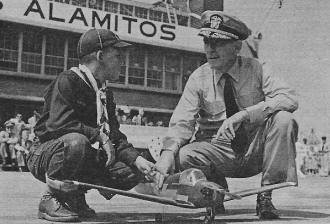
Felix Toedter of the Costa Mesa, Calif. Cub Scout Pack and the
Navy's Reserve Chief, Rear Admiral Dan V. Gallery.

Usual feverish scene at the hangar with modelers rebuilding or
just finishing up models. Thunderbugs' trailer in center.
Wakefield flying was real good although one by one most of the guys goofed on
one flight or another. Models were smashed to many pieces as the boys tried to pack
in one too many. Smartest operator was Woody Blanchard, who insisted on winding
outside even though it meant going over to his car to wind, then carrying his fully
wound ship back out to the takeoff area. Dick Baxter developed a power stall to
ruin his chances, Gene Wright was seen to gather all the pieces in a shopping bag
for a quick trip to the hangar and a repair job. He got it back in the air, too,
for 6th place! Jerry Thomas put in an early 14:14 which stood up for 1st place.
He was closely followed by Buster Allen's 13:51.
In Half-A speed the Mono-line team of Clem, Beasley and Kirn made it apparent
that if you weren't using Mono-line you were going too slow, as they cracked that
magic barrier of 100 with 100.89 mph; this ship was really moving, and so was Dale
in getting around that pylon.
The third day found the guys going hot and heavy again. Woody Blanchard got off
to an early lead in the International PAA-Load and held it to win with 13:18. Don
Alberts had posted a total of 36:00 in Half-A before 9:30 which really stood up,
Bill Fox joined the "Club" with 2:11 his 4th flight but no one else managed the
3 sixes. Second place in Half-A Senior was 19 minutes behind. Bobby Patchin topped
Jr-Sr-International with a 7-minute margin. Unlimited rubber saw Gene Wright's market
basket of pieces top time in open, Don Alberts had top time in senior and the highest
time of the meet in rubber. In Jr Stunt Ed May Jr topped all other juniors with
319 points while William Cummings was high man in senior with 358.4.
A speed found more records broken, Torp .19's and Mono-Lines again going faster
than ever before. Gayle Clement was tops in senior with 134.73, while ole man Wisniewski
really chugged around that pylon in his winning 141.73. Mike O'Bryan was top man
in junior with 126.40.
The fourth day saw the hand-launched gliders filling the sky, lots of them being
lost. Quite a few lads managed at least one. six, but very few got in the second
six. Highest time was in senior where Eddie Schmutz had 14:11.3. Hank Cole won open
with 12:04, while Ernie Prosch won junior with 8:49.6.
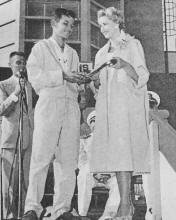
David Arne, 14, of Yuba City. Calif., is awarded Junior National
Champion plaque by Hillevi Rombin, Miss Universe of 1955.
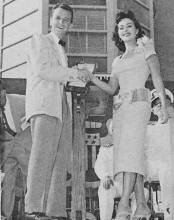
Willard Blanchard. Jr., 31, Hampton, Val, gets Open Class and
National Champion award from starlet Marla English.
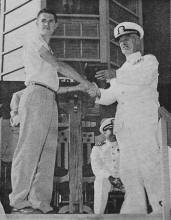
Don Alberts, 20, of Albuquerque. N. M., is awarded Senior National
Champion plaque by Vice-Admiral Harold M. Martin, USN.
America Class PAA or the old Half-A saw some very good times, Richard Epstein
totaling 15:22 in Jr-Sr, L. T. Everett 14:25 for open. As in glider there were a
lot of six-minute flights, very few got 2 sixes and none of them 3 sixes. Class
A free flight was also low in total time-only one man, John Nogy, managed 3 sixes,
and he didn't take his 4th. Marty Wolff won senior with 16:36, David Arne junior
with 14:00.
Bob Palmer won his first Nationals stunt first place with a fine 362 points,
followed very closely by Jose Sadurni of Mexico City with a really original stunt
model. In B speed that team of Clem, Beasley and Kirn got off to a roaring 143.08,
followed by Bob Lauderdale with 141.17. Senior was won by Daniel Berry with 127.75,
while Clifton Medlock won Jr with 129.77.
The fifth day of flying produced some fast and furious action in the V-control
circles. Open combat ended up in a three-way tie. Don Smith, Joseph Freeman and
Jack Obleness all totaled 540 points, which quite naturally ended up in a fly-off;
when the smoke and dust had cleared they ended in the above order. Meanwhile in
proto speed those three Texans, Clem, Beasley and Kirn were really moving. They
averaged 113.85 from a standing start, doing a lot of laps at 121 to 122 mph, which
could place high in a lot of B speed contests. Karl Caldwell was the only other
entrant to top 100 mph. Dennis Schaver won senior and Richard Rehwald junior with
team racers.
Just one circle down from the proto activity the C speed ships were going faster
than ever before. Bob Lauderdale and the Clem, Beasley and Kirn combination had
a down to the wire fight all to themselves, the second-place team going more than
10 mph faster than the 3rd place winner. Bob won this event with an unprecedented
168.47 mph! Dick Bradford topped 154 in senior for first, while Mike O'Bryan topped
149 for first in junior.
Down free flightway, B free flight ended up in more of a race than C speed. Four
guys had 3 sixes in the open class - Harry Gould, Toshi Matsuda, Earl Anderson and
Mike Kostich. On their 4th flights Harry did 11:25 for first, the rest following
in order. Senior Bob Gelvin totaled 16:56 to nose out Lee Hines; a similar close
race in junior found Bob Johnson nosing out Alan Fleming. .
In Half-A flying scale Bob Gelvin posted the winning Jr-Sr points for his 2nd
first place of the day, while in the open division Bob Hill won his umpteenth in
a row, nosing out R. Petro and Dick Baxter.
The Nordic glider event was most joyous for YM's Dick Everett, it really gladdened
his heart, because there were so many entrants. Dick Sladek became the first man
in this country to total 53's in competition, then he went on to do 8 minutes plus
for a real record. There were more than 20 contestants who totaled over 12 minutes
for their 5 flights, which is an average of 2:24 plus, some real good flying. Fred
Wells won senior with 14:02 and David Arne, junior with 13:13.
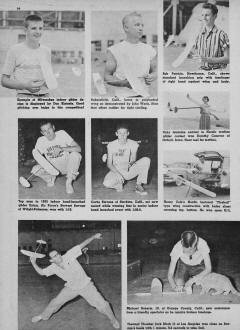 The sixth and last day, Sunday, found close
to 100 contestants down at "Lake Los Alamitos" for the hydro activity. Ed Mates
got off to an early start and posted 16:30 in open, which looked like a sure thing
until Manny Andrade came up and posted 36's with a Half-A job and then 2:48 for
a booming 20:48 and the winning time. Jack Thomas put in a last-minute 58-second
flight to total 12:58 for the senior event, while Jack Moreland put in an early
12:51 to easily win junior. The sixth and last day, Sunday, found close
to 100 contestants down at "Lake Los Alamitos" for the hydro activity. Ed Mates
got off to an early start and posted 16:30 in open, which looked like a sure thing
until Manny Andrade came up and posted 36's with a Half-A job and then 2:48 for
a booming 20:48 and the winning time. Jack Thomas put in a last-minute 58-second
flight to total 12:58 for the senior event, while Jack Moreland put in an early
12:51 to easily win junior.
Limited glider also had a lot of entrants. Don Tune posted the high time to win
senior with 13:25, Ralph Harmon totaled 9:11 for junior and James Scarborough posted
the highest time of the day to take open.
In control line flying scale that experts' expert, Tom Dean, topped John Tatone
to win first again. Jimmy McCroskey repeated his last year's victory by capturing
senior honors; Gary Cummings Jr flew off with junior honors. Dean had a new model
under construction, a Luscombe, which prompted Tatone to remark "what's the use"
- the model has scale rivets in every spot where the real plane uses one.
In Clipper Cargo, favorite Jim Lang lifted an early 41 ounces for what looked
like a sure winner only to have that grand old man of model flying, C. O. Wright,
lift 41 3/4 ounces to nose him out. Subsequent flights by Lang ended up in disaster
when the wind flipped him upside down, smashing his wing. This 41 3/4 is a new record.
In the U-control circles the team race event was won by that very consistent
Senior, Ron Schauer. This lad is only 18 and is whipping everyone with this very
fast ship. Navy Carrier was real close; R. M. Post nosed out Russ Beattie by 9 points,
his 391.93 being a very good total.
PAA-Load endurance saw only 3 entrants, but Dick Heist's 1:08:14 winning time
was a new record for this event. Jet found the guys really going fast again and
again with Clem, Beasley and Kirn as the winning combination with their 162.83 mph
plus nosing out Jim Summersett by 0.5 mph - this was mighty close and is another
new record.
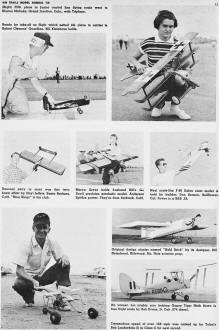 Hot as the competition was in most events,
hottest by far were the championship races. Only one age champion won by Saturday,
David Arne of Yuba City. Hal Cover and Don Alberts were very close, Don winning
by gaining points in ROW after smashing his ship up three times, then putting it
back together. Don was 16 points behind Hal when the Sunday flying started. Hot as the competition was in most events,
hottest by far were the championship races. Only one age champion won by Saturday,
David Arne of Yuba City. Hal Cover and Don Alberts were very close, Don winning
by gaining points in ROW after smashing his ship up three times, then putting it
back together. Don was 16 points behind Hal when the Sunday flying started.
Woody Blanchard landed a ship on the Carrier Deck for the first time in his life
to nose out Karl Caldwell by 10 points. Woody did some real thinking in winning
his second straight National and Open Championship, picking events he was sure to
get points in and then spotting the weakness in the point system to garner the points
he so sorely needed.
The Thermal Thumbers in winning the team championships entered those events in
which they love to build and fly models, all free flight events and mostly the non
gas powered events. They got off to an early lead on Indoor day and increased their
points every day. They saw their margin decrease as the days went on, but they held
on to total 2373 points and win. Second place was Air Force #1 team's 1738 and the
San Francisco Vultures' 1630.
The comment of some speed flyers was that the guys who fly "Biline" should be
allowed 10 mph to catch the Mono-Line models... The really amazing percentage of
successful speed flights, very few attempts that did not get off.
The team flying of two B-29s by the San Diego Eurekas sure stopped the crowd,
as did five guys in one team race or rat race, as so many called it.
Another model building first can be chalked up-the first vertical rise-off-water
model. Charles A. Lindley put blown-up penny balloons over 3/8" balsa dowels on
his stab tips with a retractable tripod foot on the fuselage similarly equipped
to make a lot ask questions about legality. Some went so far as to state that it
would ruin ROW events. What was really good is that this same guy flies VTO all
the time - is there a difference as long as the plane will ROW and pass the float
test? Charley didn't hook into any thermals but his 3-minute average with a long
flight of 3:17 sure speaks for itself. One of the Navy timers was heard to say,
"It looks like a flying pawnshop."
Pop Robbers was awarded the Flying 8 Ball trophy and immediately became worried
with what he could do with it. The thing wouldn't fit in his car, maybe he'd award
it to someone else - at last count he was talking to Mom and to himself.
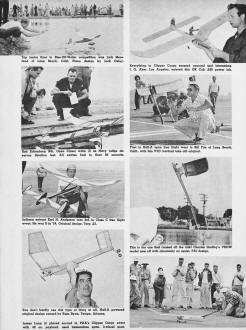 The free flight system as used for the first
time kept the take-off area clear of all obstructions. This was suggested by June
Dyer at the '52 Nats and used experimentally on the last day. It consisted of a
100-foot circle laid out on the runway. All flyers were required and monitored by
the timers and judges to start their engines up outside the circle; after the engine
was started they disconnected their boosters, picked up their ship, moved it into
this take-off circle and let it ROG. It worked fine, too - much better than the
lack of system used at most contests where one must try to pick up a space between
boosters and gas cans which is large enough to allow your ship to take off. The free flight system as used for the first
time kept the take-off area clear of all obstructions. This was suggested by June
Dyer at the '52 Nats and used experimentally on the last day. It consisted of a
100-foot circle laid out on the runway. All flyers were required and monitored by
the timers and judges to start their engines up outside the circle; after the engine
was started they disconnected their boosters, picked up their ship, moved it into
this take-off circle and let it ROG. It worked fine, too - much better than the
lack of system used at most contests where one must try to pick up a space between
boosters and gas cans which is large enough to allow your ship to take off.
All in all this contest was by far the best organized ever. The Navy personnel
was superb, they had been taught to do a job, so they did it better than the teachers
could have. Accommodations were excellent. V.I.P.'s for autographs were all over
the place. Secretary of the Navy Thomas presented the Grand Championship award.
Analyses of National Modelplane Winners
Through the cooperation of America's top-place competition flyers you see here
the most detailed listing ever to appear in "ATMA"
United States Aero Championships of 1955
Example of Milwaukee indoor glider design is displayed by don Kintzele. Good
pitching arm helps in this competition!
Bakersfield, Calif., leans to polyhedral wing as demonstrated by John Wertz.
Note that offset rudder for tight circling.
Top man in 1955 indoor hand-launched glider flying. Air Force's Stewart Savage
of Wright-Patterson , won with 1:10.
Curtis Stevens of Stockton, Calif., set new record while winning first in senior
indoor hand launched event with 1:06.6.
Bob Patchin Hawthorne, Calif., shows standard launching grip with forefinger
of right hand against wing and body.
Only feminine entrant in Nordic towline glider contest was Dorothy Conover of
Oxford, Iowa. Neat reel for towline.
 Henry Cole's Nordic featured "Fireball"
type wing construction with balsa sheet covering top, bottom. he won open H/L. Henry Cole's Nordic featured "Fireball"
type wing construction with balsa sheet covering top, bottom. he won open H/L.
Michael Roberts, 10, of Orange County, Calif., gets assistance from a friendly
spectator as he repairs broken fuselage.
Thermal Thumber Jack Block (l) of Los Angeles was close on Savage's heels with
1 minute, 9.4 seconds to take 2nd.
(Right) Fifth place in junior control line flying scale went to Sharen Mahnke,
Grand Junction, Colo., with Triplane.
Ready for take-off on flight which netted 4th place in carrier is Robert Clemens'
Guardian. Bill Kleinhaus holds.
Unusual entry in stunt was this twin-boom affair by Hoyt Jeffers, Santa Barbara,
Calif. "Ring Kings" is his club.
Marva Grove holds husband Bill's Go Devil precision aerobatic model. Anderson
Spitfire power. They're from Burbank, Calif.
Neat scale-like F-86 Sabre stunt model is helf by builder, Don Benson, Bellflower,
Cal. Power is a K&B .29.
Original design stunter named "Gold Brick" by its designer, Bill Netzeband, Kirkwood,
Mo. Note scimitar prop.
No winner, but mighty nice looking: Gypsy Tiger Moth flown in free flight scale
by Bob Evans, Jr. Cub .074 diesel.
Tremendous speed of over 168 mph was racked up by Tulsa's Bob Lauderdale (l)
in Class C for new record.
Top junior flyer in Rise-Off-Water competition was Jack Moreland of Long Beach,
Calif. Plane design by Jack Oxley.
Rod Echenburg (4th, Open Class) waits (l) as Navy judge observes flotation test.
All entries had to float 30 seconds.
Indiana entrant Earl H. Anderson was 3rd in Class C free flight event. He won
B in '54. Original design, Torp. .23.
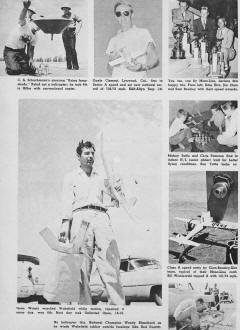 You don't hardly see this type of thing
at all. Half-A powered original design canard by Russ Ryand, Tempe, Arizona. You don't hardly see this type of thing
at all. Half-A powered original design canard by Russ Ryand, Tempe, Arizona.
James Lang (r) placed second in PAA's Clipper Cargo event with 40 oz. payload,
used tremendous span, 3-wheel gear.
Everything in Clipper Cargo seemed unusual and interesting. I. G. Aker, Los Angeles,
entered this OK Cub .048 power job.
First in Half-A open free fliqht went to Bill Fox of Long Beach, Calif., with
this VTO (vertical take off original.
This is the one that caused all the talk! Charles Lindley's VROW model gets off
with absolutely no assist. FAI design.
Only man to top 20 minutes indoors was motor mamufacturer Bill Atwood (1) here
recovering wing. Joe Bilqri watches.
Charles Dorsett of San Francisco displays fine traveling box for indoor microfilm
models. Wally Reale (r) looks on.
Everybody hold his breath! Glen Cunningham, Phoenix, lifts sheet of microfilm
from improvised tank at indoor site.
Third in open cabin and stick, Warren Williams of L. A. Thermal Thumbers helped
team with with this cabin craft.
Lt. Georqe Matsumoto, USAF, (l) weighs in C free flight. He took 1st in Far East
AF Eliminations to win U.S. trip.
Great guy and the new weight-lifting champ, C. O. Wright! CO's model, an original
design, lifted 41 3/4 oz. to win.
Second place in helicopters went to Larry Crissman with this 2·Jetex powered
entry. Larry used Jetex 150's.
Indoor site (I) at Santa Ana was blimp hangar which is 200 feet wide, 1,100 feet
long and 200 feet high!
C. A. Schuchmann's amazing "flying lampshade." Ruled not a helicopter; he took
4th in Hiller with conventional copter.
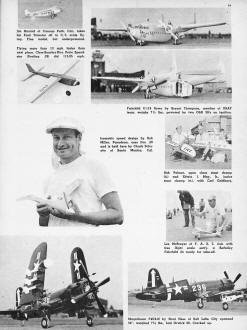 Gayle Clement, Lynwood. Cal., first in Senior
A speed and set new national record of 134.73 mph, K&B-Allyn Torp .19. Gayle Clement, Lynwood. Cal., first in Senior
A speed and set new national record of 134.73 mph, K&B-Allyn Torp .19.
Gene Wright wrecked Wakefield while testing, repaired it same day, won 6th. Next
day took Unlimited Open, 14:13.
No helicopter this. National Champion Woody Blanchard as he winds Wakefield rubber
outside fuselage (like Red Everitt).
You, too, can fly Mono-Line, declare this happy trio. From left: Dale Kirn, Jim
Clem and Sam Beasley with their speed awards.
Mickey Tuttle and Chris Peterson (2nd in indoor H/L junior glider) wait for better
flying conditions. Ron Tuttle looks on.
Class A speed entry by Clem-Beasley-Kirn team, typical of their Mono-Line craft.
Bill Wisniewski topped A with 141.73 mph.
Jim Hazard of Canogo Park, Cal., takes his Ford Trimotor off in C /L scale flying.
Fine model, but underpowered.
Flying more than 13 mph faster than next place, Clem-Beasley-Kirn Proto Speedster
(Dooling .29) did 113.85 mph.
Fairchild C-119 flown by Bryant Thompson, member of USAF team, weighs 7 1/2 lbs.,
powered by two O&R 29's on ignition.
Isometric speed design by Bob Miller, Pasadena, uses Fox .59 and is held here
by Chuck Schuette of Santa Monica, Cal.
Bab Palmer, open class stunt champ (lt.) and Edwin J. May, Jr., junior stunt
champ (rt.), with Carl Goldberg.
Les McBrayer of F. A. S. T. club with free flight scale entry, a Berkeley Fairchild
24 ready for take-off.
Magnificent F4U5-N by Noal Hess of Salt Lake City spanned 52", weighed 7 3/4
lbs., had Orwick 60. Cracked up.
Posted September 14, 2024
|


